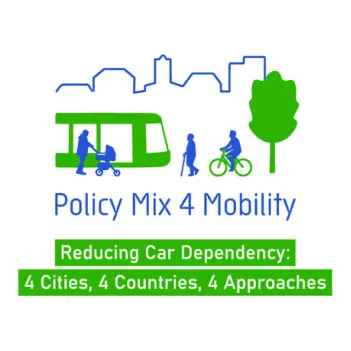POLICYMIX4MOBILITY
Policy mixes for urban mobility transitions: Diffusing sustainable mobility options whilst reducing car dependency

© POLICYMIX4MOBILITY
- Category
- Project
- Call
- DUT Call 2023
- Duration
- –
- Project coordinator
- Institute for Ecological Economic Research (IÖW)
Car dependency poses major challenges for cities, contributing to socio-economic inequality, health problems, greenhouse gas emissions, and air pollution. While technological solutions and modal shift policies have been explored, car use remains dominant. Conflicts over public space and unequal access to mobility options persist, highlighting the need for improved governance of urban mobility transitions.
POLICYMIX4MOBILITY addresses the central question: How can different types of policy mixes, political strategies, and institutional, procedural, and social innovations support transitions away from car dependency toward climate neutrality, while ensuring inclusion and social justice?
The project seeks to understand how combinations of policies can promote sustainable mobility and reduce car use. By developing an inter- and transdisciplinary approach, POLICYMIX4MOBILITY aims to identify how various policy mixes influence urban mobility and support inclusive, climate-friendly transitions in cities.
POLICYMIX4MOBILITY makes a unique conceptual and empirical contribution by integrating insights from multiple research fields to address its core question. Interdisciplinary research is combined with transdisciplinary co-production in four urban labs in the project cities—Collegno (Italy), Fürstenwalde/Spree (Germany), Limassol (Cyprus), and Odense (Denmark)—and within a broader urban mobility forum.
These labs, co-created with city administrations, focus on real-world mobility challenges to support evidence-based, transparent decision-making. City partners are active contributors, not just research subjects. A multi-method approach—combining qualitative and quantitative methods such as modelling, case studies, and policy mix mapping—enables comparative analysis across cities and national contexts. This triangulation ensures more valid, robust findings.
The project co-produces strategies, tools, and guidelines, resulting in a practical mobility policy mix toolbox. Outputs include strategies for integrative, transformative policy mixes, an evaluation framework, and multidimensional impact analyses for diverse stakeholders, as well as peer-reviewed publications for scholars in mobility transitions and sustainability policy.
Co-creation activities in four urban labs in the project cities and through the broader Urban Mobility Forum are central to POLICYMIX4MOBILITY’s approach. These activities ensure that the needs of city administrations working to reduce car dependency are addressed, while fostering capacity building, knowledge transfer, and peer learning across Europe. A key outcome will be a comprehensive framework for evaluating and monitoring the effects of urban mobility policy mixes, helping cities understand the direct and indirect impacts of their strategies on sustainable mobility. This will be supported by a practical mobility policy mix toolbox, including political strategies, guidelines, and tools.
The project will also promote administrative learning, driving institutional and procedural innovations that enhance cities' ability to design and implement transformative policies. These efforts support experimentation and real-world implementation, delivering scientific insights and practical outputs that enable more liveable, inclusive, and climate-neutral urban transformations.
Denmark
Germany
Italy
Aalborg Universitet, Limassol municipality, MaasLab, Odense Kommune, TRT Trasporti E Territorio Srl, Zona Ovest di Torino SRL
Comune Di Collegno, Stadtverwaltung Fürstenwalde/Spree, Verkehrsclub Deutschland e.V. - VCD
Project video
Connect to YouTube?
To play this video, a connection to YouTube will be established, and personal data will be transmitted to YouTube.
Links
Contact
Florian Kern
florian.kern@ioew.de
Richard Harnisch
Richard.Harnisch@ioew.de